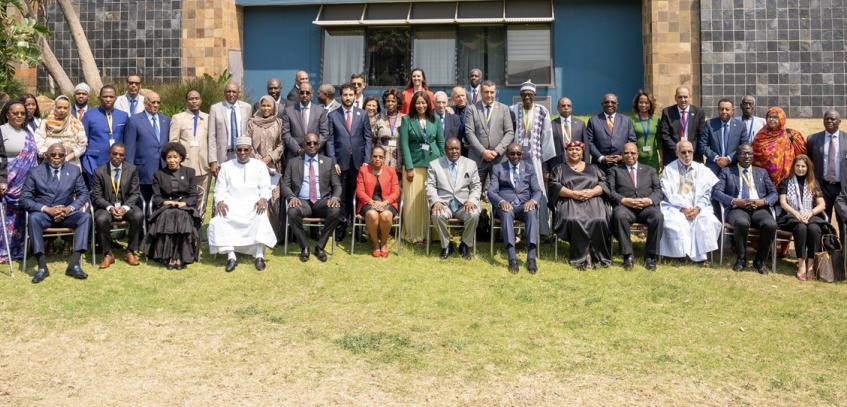The Pan-African Parliament has convened the 12th Annual Conference of Speakers of National and Regional Parliaments at its headquarters in Midrand, South Africa. This gathering of Presiding Officers of African legislatures takes place from 18 to 20 September 2024 alongside the Sitting of the Permanent Committees and other organs of the Pan-African Parliament, under the African Union's 2024 theme: "Educate an African Fit for the 21st Century: Building Resilient Education Systems for Increased Access to Inclusive, Lifelong, Quality, and Relevant Learning in Africa."
Building on the 11th Annual Conference of Speakers of African National Parliaments in 2022, the 12th edition brings together leaders of national and regional parliaments to reflect on and offer parliamentary solutions to the continent's contemporary challenges. These include ensuring inclusive, accessible, and heritage-based education in line with the African Union's theme for 2024, reviewing the peace and security landscape, leveraging parliamentary diplomacy to silence the guns, and guaranteeing durable peace. The conference also assesses progress in implementing Agenda 2063 and examines how parliaments can accelerate continental development, as well as review the African Continental Free Trade Area Agreement (AfCFTA) and the critical role parliaments play in fostering an enabling legislative and policy environment.
In his keynote address as the Guest of Honour at the conference's official opening, H.E.Kembo Dugish Campbell Mohadi, Vice President of the Republic of Zimbabwe, emphasized the need to accelerate the deployment of science, technology, and innovation as tools to overcome colonial legacies and advance continental integration. He also stressed the importance of effective coordination among Regional Economic Communities (RECs) and called for empowering women and youth—two key forces vital to Africa’s development.
“By focusing on optimizing returns from natural resources and turning both domestic and global challenges into opportunities, Africa can emerge as a competitive economic bloc, transcending historical constraints to embrace a future of industrialization, trade, and development. Africa must rise as a competitive economic bloc. We are proud of being African, and we have a rich history of overcoming colonialism,” said H.E. Mohadi.
H.E. Chief Fortune Charumbira, President of the Pan-African Parliament and host of the gathering emphasized in his opening remarks that the goal of the conference is to promote coordination and harmonization of parliamentary action. He highlighted its importance in advancing the African Union’s 2024 theme, ratifying AU treaties, and finding lasting solutions to issues such as peace and security, food, and energy insecurity—challenges that are exacerbated by the climate crisis and affect sustainable development. The President of the continental Parliament also underscored the crucial role of Speakers of Parliament as political leaders of essential state organs.
"For people of your stature to take time out of your busy schedules to attend this conference, we must have a compelling agenda," he stated, urging participants to focus on transforming education systems, addressing inequalities, and using parliamentary diplomacy to promote peace, security, and continental integration amid ongoing political instability and conflict.
Speaking at the same event, Rt. Hon. Thoko Didiza, Speaker of the National Assembly of South Africa, affirmed her country's commitment to the Host Country Agreement and its support for building a permanent seat for the Pan-African Parliament. She noted that the Pan-African Parliament should act as a coordinating body for African parliaments in international meetings and play a leadership role in that regard. "The Pan-African Parliament, as the continental parliament, remains an important vehicle and enabler to solve the challenges of peace and instability. It is a linchpin in overcoming division and building united communities on our continent," she said.
The Pan-African Parliament works closely with national and regional parliaments, as outlined in Article 18 of the Sirte Protocol, which states: "The Pan-African Parliament shall work in close cooperation with the Parliaments of the Regional Economic Communities and the National Parliaments or other deliberative organs of Member States. To this effect, the Pan-African Parliament may, in accordance with its Rules of Procedure, convene annual consultative fora with the Parliaments of the Regional Economic Communities and the National Parliaments or other deliberative organs to discuss matters of common interest."
Over the past decade, the Pan-African Parliament has institutionalized the Annual Conference of Speakers of African National Parliaments as a platform to promote the ratification, domestication, and implementation of AU legal and policy instruments related to shared values such as human rights, democracy, peace and security, good governance, constitutionalism, and the rule of law. The conference also serves as a key platform for coordination and harmonization among national and regional parliaments on AU legal and policy frameworks and for sharing best parliamentary practices that support and advance African economic integration and development.
As part of this year’s deliberations, the Speakers of Parliament will receive updates on the African Union theme for 2024, with a special focus on the case of South Africa presented by Dr. Reginah Mhaule, Deputy Minister of Basic Education of South Africa. Additionally, they will hear briefings on the progress of the African Continental Free Trade Area (AfCFTA) and how parliaments can help create an enabling legislative and policy environment, delivered by H.E. Wamkele Mene, Secretary General of the AfCFTA Secretariat. Other key presentations include an update on Agenda 2063's progress and challenges by Ms. Botho Kebabonye Bayendi, AU Commission Director of Strategic Planning; an overview of Africa's health resilience with a focus on future pandemics by Dr. Lul Reik, Africa CDC Regional Coordinator; and the impact of climate change on the continent by Mr. Charles Peter Mwangi Nyambura, Director of Programmes and Research at the Pan-African Climate Justice Alliance (PACJA). Finally, Presiding Officers will engage with Professor Pierre Moukoko Mbondjo, Head of the AU Reform Unit, on AU institutional reforms and their expected impact.








